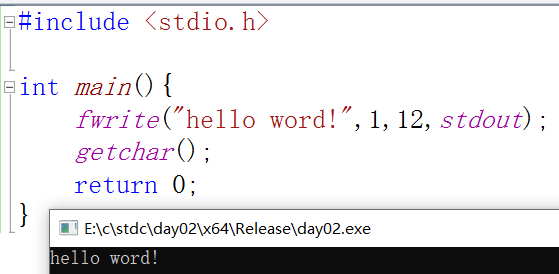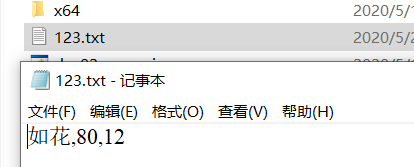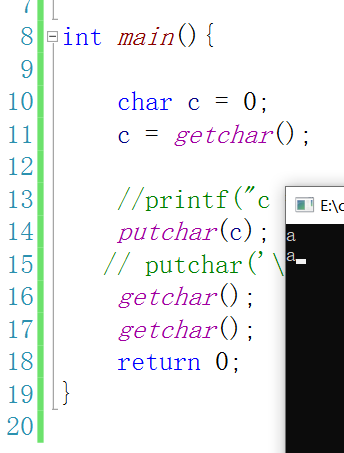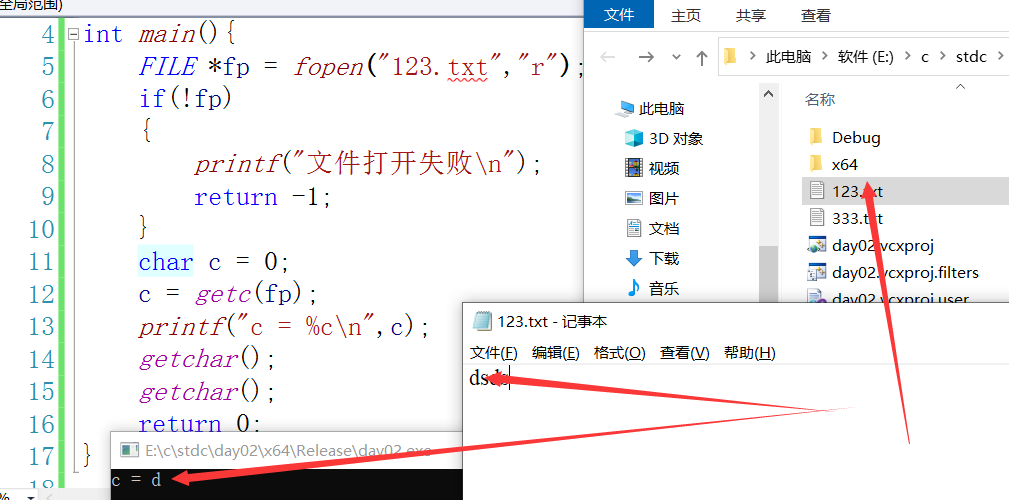015_stdc_C语言
回顾:
函数指针
void * 无类型的指针
有类型的指针都可以给 无类型的指针进行赋值
无类型的指针在使用的时候,要将其转换为具体的某个类型才能使用
内存管理函数
malloc 返回就是一个无类型的指针
free 释放动态申请的内存
calloc
realloc
时间函数
time();
ctime
struct tm *
localtime()
gmtime()
//为需要管理系统,添加录入时间的成员
---------------------------
标准函数库
输入输出函数
printf
scanf
文件的输入输出
fopen打开文件
FILE *fopen(const char *path, const char *mode);
1.头文件
#include <stdio.h>
2.参数
const char *path: 要打开文件的路径(文件名)
第二个参数
const char *mode:
r : 以只读方式打开文件.文件流指针在文件开始位置
r+: 以读/写方式打开文件.文件流指针在文件开始位置
w : 以只写方式打开文件.文件流指针在文件开始位置
文件如果不存在则创建文件,如果文件存在,清空原来文件的内容
w+ : 以读/写方式打开文件.文件流指针在文件开始位置
文件如果不存在则创建文件,如果文件存在,清空原来文件的内容
a : 以追加的方式打开文件.文件流指针在文件末尾位置
文件如果不存在则创建文件,如果文件存在,不清空原来文件的内容
a+ : 以追加的方式打开文件,可读.写入文件流指针在文件末尾位置,如果是读文件流指针在最开始的位置
文件如果不存在则创建文件,如果文件存在,不清空原来文件的内容
3.返回值
成功返回 指向文件的结构体指针,失败返回NULL
#include <stdio.h> int main() { FILE *fp=fopen("day133.txt","r"); if(NULL == fp) { printf("打开文件失败\n"); return -1; } printf("文件打开成功\n"); fclose(fp); //关闭文件 fp = NULL; //防止野指针 getchar(); return 0; }
#include <stdio.h> int main() { FILE *fp=fopen("day133.txt","w"); if(NULL == fp) { printf("打开文件失败\n"); return -1; } printf("文件打开成功\n"); fclose(fp); //关闭文件 fp = NULL; //防止野指针 getchar(); return 0; } 文件打开成功

fwrite写文件
头文件 #include <stdio.h> size_t fwrite(const void *ptr, size_t size, size_t nmemb, FILE *stream); 参数: 第一个参数 写入到文件内容的内存起始地址 第二个参数 写入内容元素 大小 第三个参数 写入元素的个数 第四个参数 写入文件的结构体指针(写到哪个文件) 返回值: 返回实际写入到文件的元素个数 通常返回 第三个参数
#include <stdio.h> int main() { int b= 97; FILE *fp=fopen("day133.txt","w"); if(NULL == fp) { printf("打开文件失败\n"); return -1; } printf("文件打开成功\n"); fwrite(&b,sizeof(int),1,fp);//写入一个字符 a 到文件 fclose(fp); //关闭文件 fp = NULL; //防止野指针 getchar(); return 0; }

#include <stdio.h> #include <string.h> typedef struct{ char name[20]; int score ; int age; } Student; int main() { int b= 97; Student s; strcpy(s.name,"如花"); s.score = 80; s.age= 12; FILE *fp=fopen("day133.txt","w"); if(NULL == fp) { printf("打开文件失败\n"); return -1; } printf("文件打开成功\n"); int i =fwrite(&s,sizeof(s),1,fp);//写入一个学员信息 printf("i = %d\n",i); fclose(fp); //关闭文件 fp = NULL; //防止野指针 getchar(); return 0; }

fread读文件
size_t fread(void *ptr, size_t size, size_t nmemb, FILE *stream);
参数:
第一个参数 将文件内容的内存起始地址
第二个参数 读内容元素 大小
第三个参数 读元素的个数
第四个参数 读文件的结构体指针(从哪个文件获取数据)
返回值:
返回实际从文件读入到内存的元素个数 通常返回 第三个参数
#include <stdio.h> #include <string.h> typedef struct{ char name[20]; int score ; int age; } Student; int main() { int b= 97; Student s; strcpy(s.name,"如花"); s.score = 80; s.age= 12; FILE *fp=fopen("day133.txt","r+"); if(NULL == fp) { printf("打开文件失败\n"); return -1; } printf("文件打开成功\n"); #if 0 int i =fwrite(&s,sizeof(s),1,fp);//写入一个学员信息 printf("i = %d\n",i); #endif #if 1 fread(&s,sizeof(s),1,fp); printf("name = %s\n",s.name); printf("score = %d\n",s.score); printf("age = %d\n",s.age); #endif fclose(fp); //关闭文件 fp = NULL; //防止野指针 getchar(); return 0; } 文件打开成功 name = 如花 score = 80 age = 12
跟文件流指针相关的函数
ftell()
告诉用户 文件流指针当前位置
传入 文件结构体指针
返回 相对于文件起始位置的偏移(字节)
rewind()
复位文件流指针,文件流指针指向最开始的位置
传入 文件结构体
没有返回值
#include <stdio.h> #include <string.h> typedef struct{ char name[20]; int score ; int age; } Student; int main() { int b= 97; Student s; strcpy(s.name,"如花"); s.score = 80; s.age= 12; FILE *fp=fopen("day133.txt","r+"); if(NULL == fp) { printf("打开文件失败\n"); return -1; } printf("文件打开成功\n"); #if 0 int i =fwrite(&s,sizeof(s),1,fp);//写入一个学员信息 printf("i = %d\n",i); #endif #if 1 //写在最开始的位置 printf("读前文件流指针 = %ld\n",ftell(fp)); fread(&s,sizeof(s),1,fp); printf("name = %s\n",s.name); printf("score = %d\n",s.score); printf("age = %d\n",s.age); printf("读后文件流指针 = %ld\n",ftell(fp)); rewind(fp); printf("rewind后文件流指针 = %ld\n",ftell(fp)); #endif fclose(fp); //关闭文件 fp = NULL; //防止野指针 getchar(); return 0; } 文件打开成功 读前文件流指针 = 0 name = 如花 score = 80 age = 12 读后文件流指针 = 29 rewind后文件流指针 = 0
fseek()
可以设置 文件流指针,相对于指定位置的偏移
int fseek(FILE *stream, long offset, int whence);
第一个参数: 传入设置文件的结构体指针
第二个参数: 偏移的距离(字节)
第三个参数: 相对于哪个位置的偏移
第三个参数 有下面的三个宏(int)
SEEK_SET: 文件开始
SEEK_CUR: 当前位置
SEEK_END: 文件末尾
#include <stdio.h> #include <string.h> typedef struct{ char name[20]; int score ; int age; } Student; int main() { int b= 97; Student s; strcpy(s.name,"如花"); s.score = 80; s.age= 12; FILE *fp=fopen("day133.txt","r+"); if(NULL == fp) { printf("打开文件失败\n"); return -1; } printf("文件打开成功\n"); #if 0 int i =fwrite(&s,sizeof(s),1,fp);//写入一个学员信息 printf("i = %d\n",i); #endif #if 1 //写在最开始的位置 printf("读前文件流指针 = %ld\n",ftell(fp)); fread(&s,sizeof(s),1,fp);//将读到的内容放到s结构体里面 printf("name = %s\n",s.name); printf("score = %d\n",s.score); printf("age = %d\n",s.age); printf("读后文件流指针 = %ld\n",ftell(fp)); fseek(fp,-8,SEEK_END);//设置流文件指针回退8个字节 printf("fseek后文件流指针 = %ld\n",ftell(fp)); int i = fread(&b,sizeof(int),1,fp);//将读到的内容放到b变量里面 printf("b = %d\n",b); printf("读后文件流指针 = %ld\n",ftell(fp)); #endif fclose(fp); //关闭文件 fp = NULL; //防止野指针 getchar(); return 0; } 文件打开成功 读前文件流指针 = 0 name = 如花 score = 80 age = 12 读后文件流指针 = 29 fseek后文件流指针 = 21 b = 80 读后文件流指针 = 25
#include <stdio.h> #include <string.h> typedef struct{ char name[20]; int score ; int age; } Student; int main(){ char c = 'a'; int b = 97; Student s; strcpy(s.name,"如花"); s.score = 80; s.age= 12; Student a[]={0}; FILE *fp=fopen("day133.txt","r+"); //文件流指针 在开始的位置 if(NULL == fp) { printf("打开文件失败\n"); return -1; } printf("文件打开成功\n"); //练习,修改学员的年龄,其他信息不修改,通过文件流指针 b = 10; #if 0 printf("写前文件流指针 = %ld\n",ftell(fp)); int i =fwrite(&s,sizeof(s),1,fp); //文件流指针 在文件末尾 printf("write i = %d\n",i); printf("写后文件流指针 = %ld\n",ftell(fp)); #endif #if 1 fseek(fp,24,SEEK_SET);//设置流文件指针 printf("fseek后文件流指针 = %ld\n",ftell(fp)); int i =fwrite(&b,sizeof(int),1,fp); printf("write i = %d\n",i); printf("写后文件流指针 = %ld\n",ftell(fp)); #endif rewind(fp); printf("rewind后文件流指针 = %ld\n",ftell(fp)); fread(&a[0],sizeof(s),1,fp); printf("name = %s\n",a[0].name); printf("score = %d\n",a[0].score); printf("age = %d\n",a[0].age); printf("读后文件流指针 = %ld\n",ftell(fp)); //关闭文件 fclose(fp); fp = NULL; //防止野指针 getchar(); return 0; }
文件打开成功
fseek后文件流指针 = 24
write i = 1
写后文件流指针 = 29
rewind后文件流指针 = 0
name = 如花
score = 80
age = 10
读后文件流指针 = 29
fprintf
printf --> 将打印信息 写到 标准输出设备(显示器) stdout
参数 比printf,多第一个参数,文件结构体指针

#include <stdio.h> int main(){ //fwrite("hello word!",1,12,stdout); FILE * fp = fopen("123.txt","w"); if(!fp) //if(fp == NULL) { printf("打开文件失败\n"); return -1; } printf("文件打开成功\n"); fprintf(fp,"hello world!"); fclose(fp); getchar(); return 0; }

#include <stdio.h> #include <string.h> typedef struct{ char name[20]; int score ; int age; } Student; int main(){ //fwrite("hello word!",1,12,stdout); Student s; strcpy(s.name,"如花"); s.score = 80; s.age= 12; Student a[10] = {0}; FILE * fp = fopen("123.txt","w"); if(!fp) //if(fp == NULL) { printf("打开文件失败\n"); return -1; } printf("文件打开成功\n"); //fprintf(fp,"hello world!"); fprintf(fp,"%s,%d,%d",s.name,s.score,s.age); fclose(fp); getchar(); return 0; }

不乱码是因为%d|s格式化成了字符串,所有我们能看到
fscanf
scanf 是从标准输入(键盘 stdin )设备上 读取信息
fscanf 可以从其他文件获得 信息
#include <stdio.h> #include <string.h> typedef struct{ char name[20]; int score ; int age; } Student; int main(){ //fwrite("hello word!",1,12,stdout); Student s; #if 0 strcpy(s.name,"如花"); s.score = 80; s.age= 12; Student a[10] = {0}; #endif FILE * fp = fopen("123.txt","r"); if(!fp) //if(fp == NULL) { printf("打开文件失败\n"); return -1; } printf("文件打开成功\n"); //fprintf(fp,"hello world!"); #if 0 fprintf(fp,"%s,%d,%d",s.name,s.score,s.age); #endif #if 1 fscanf(fp,"%s%d%d",s.name,&s.score,&s.age); printf("s.name = %s\n",s.name); printf("s.score= %d\n",s.score); printf("s.age= %d\n",s.age); #endif fclose(fp); getchar(); return 0; }

它会把逗号也看做是一个字符,用空格代替能正常读
字符的输入输出
getchar
int getchar(void);
返回从标准输入设备上读到的字符
putchar
int putchar(int c);
/* * getchar * */ #include <stdio.h> int main(){ char c = 0; c = getchar(); printf("c = %c\n",c); getchar(); getchar(); return 0; }
a
c = a

getc
int getc(FILE *stream);
可以对文件中的字符进行读取
传入 要读取的文件结构体指针
返回读到的字符
#include <stdio.h> int main(){ FILE *fp = fopen("123.txt","r"); if(!fp) { printf("文件打开失败\n"); return -1; } char c = 0; c = getc(fp); printf("c = %c\n",c); getchar(); getchar(); return 0; }

循环读文件里面的字符
#include <stdio.h> int main(){ FILE *fp = fopen("123.txt","r"); if(!fp) { printf("文件打开失败\n"); return -1; } char c = 0; c = getc(fp); while((c = getc(fp)) != EOF) { printf("c = %c\n",c); } getchar(); getchar(); return 0; } c = s c = d c = s c = d c = s c = d c = s c = d c = s
putc
int putc(int c, FILE *stream);
第一个参数,写入到文件的内容
第二个参数,要写入文件的结构体指针
/*
* getc
* putc
*
*[练习]
使用上两个函数 实现文件的复制
扩展:带参数main 实现任意文件名的复制
*/
#include<stdio.h> int main(){ FILE *fp = fopen("123.txt","r+"); FILE *fp1 = fopen("abc.txt","w"); if(!fp) { printf("文件打开失败\n"); return -1; } char c = 0; while((c = getc(fp)) != EOF) { //printf("c = %c\n",c); putc(c,fp1); } return 0; }
字符串输入输出
sprintf
printf 将内容输出到stdout 上
fprintf 将内容输出到文件
sprintf 将内容输出到 string (字符数组)
第一个参数为 字符串 地址 可以是数组 可以动态内存分配得到的内存
#include<stdio.h> int main(){ int i = 30; char a[20] = {0}; printf("i= %d\n",i); sprintf(a,"i = %d",i); printf("a =[%s]\n",a); getchar(); return 0; }

#include<stdio.h> #include <string.h> int main(){ char *str1 = "hello"; char *str2 = "world"; char a[20] = {0}; sprintf(a,"%s",str1); sprintf(a+strlen(str1),"%s",str2); printf("a =[%s]\n",a); getchar(); return 0; } a =[helloworld]
动态分配内存
#include<stdio.h> #include <string.h> #include <stdlib.h> int main(){ char *str1 = "hello"; char *str2 = "world"; char *a = (char *)malloc(20); sprintf(a,"%s",str1); sprintf(a+strlen(str1),"%s",str2); printf("a =[%s]\n",a); getchar(); return 0; } a =[helloworld]
sscanf
int sscanf(const char *str, const char *format, ..);比scanf多了一个指向字符串的常量指针
将一个字符串 作为 输入
#include<stdio.h> typedef struct{ char name[20]; int score ; int age; } Student; int main(){ char *pc = "如花 80 20"; Student s; sscanf(pc,"%s%d%d",s.name,&s.score,&s.age); printf("s.name = %s\n",s.name); printf("s.score= %d\n",s.score); printf("s.age = %d\n",s.age); getchar(); return 0; } s.name = 如花 s.score= 80 s.age = 20
scanf() //不能读入有空格 换行符号的字符串
gets() //不安全 容易造成缓存区溢出
fgets() //可以使用该函数替代上面的函数
char *fgets(char *s, int size, FILE *stream);
可以从stream 文件 中 读取指定字节数 size 到s所指向的内存
会读入size -1 个字符 最后一个空间是\0
如果录入的个数size-1 会把\n 放到buf中
如果大于size 多余的 字符会在输入缓冲区,需要请缓冲
#include<stdio.h> #include <stdlib.h> int main(){ char *buf = (char *)malloc(30); if(!buf) { printf("内存分配失败\n"); return -1; } FILE *fp = fopen("123.txt","r"); if(!fp) { printf("打开文件失败\n"); return -1; } fgets(buf,13,fp); //从文件读取 printf("buf = %s\n",buf); fclose(fp); free(buf); getchar(); return 0; }
#include<stdio.h> #include <stdlib.h> int main(){ char *buf = (char *)malloc(30); if(!buf) { printf("内存分配失败\n"); return -1; } FILE *fp = fopen("123.txt","r"); if(!fp) { printf("打开文件失败\n"); return -1; } fgets(buf,8,stdin); //标准输入设备 printf("buf = %s\n",buf); fclose(fp); free(buf); getchar(); getchar(); return 0; }
会读入size -1 个字符 最后一个空间是\0
如果录入的个数size-1 会把\n 放到buf中
如果大于size 多余的 字符会在输入缓冲区,需要请缓冲

int fclose(FILE *stream);
头文件 #include <stdio.h>
关闭文件,传入要关闭的文件结构体指针(fopen 函数的返回值)
成功返回 0 失败返回 EOF


